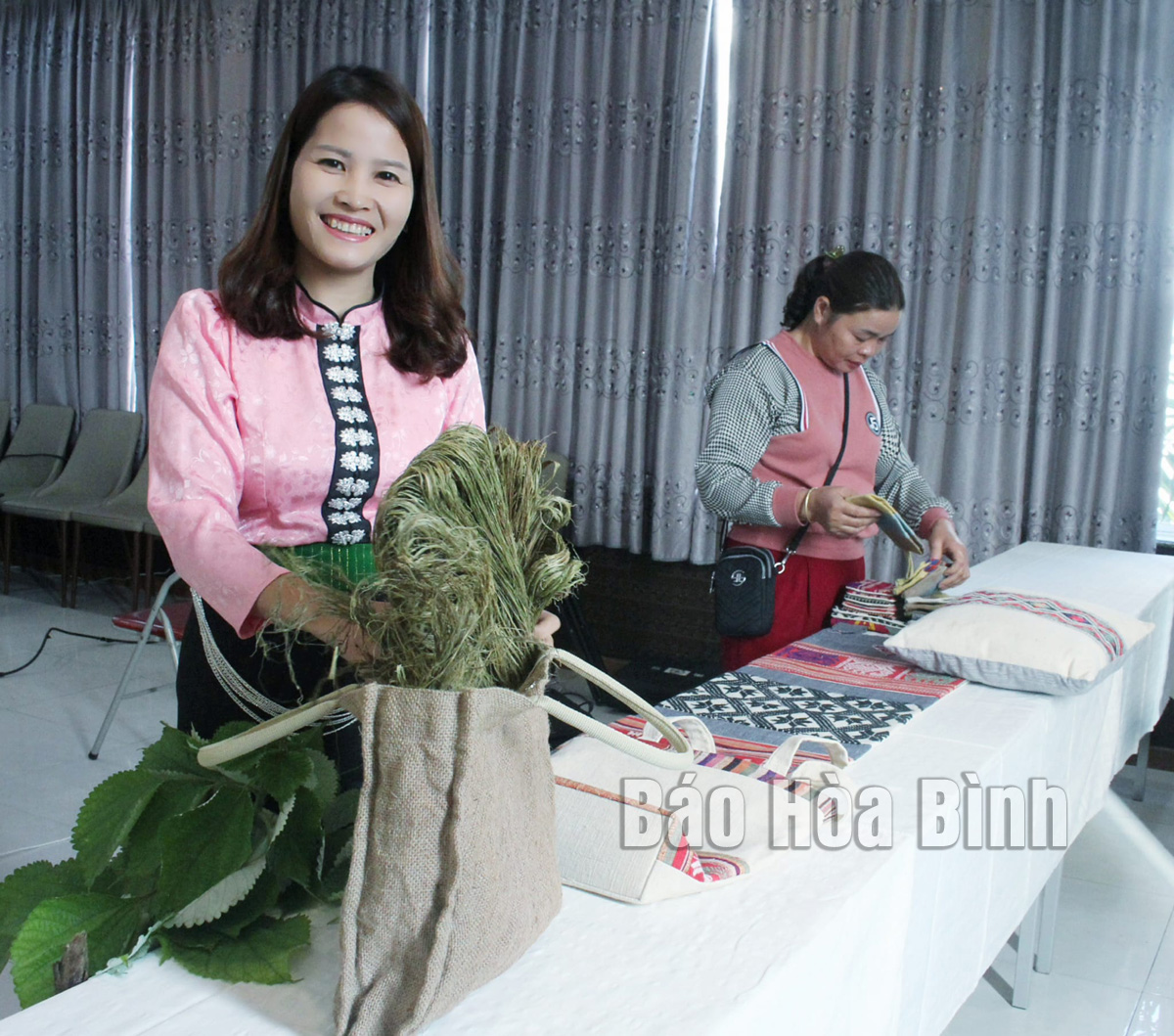
(HBO) – Bringing in Sachi and Gai Lai seedlings and encouraging local people to start planting the trees, agricultural engineer Trinh Thi Thanh Hoa, a Tay ethnic, has helped numerous mountainous commune households escape poverty.

Trinh Thi Thanh Hoa brings product to the business challenging contest.
Her product gets attention from many investors.
Hoa is a Tay ethnic, born and raised in Da Bac district.
From an early age, she understood the hardship of local farmers through trips
to remote areas with her mother. At the time, her mother was an officer at the
local agriculture and forestry extension department, with a passion for doing
something meaningful to the community.
After defending her thesis with honors and graduating from the Vietnam National
University of Agriculture, Hoa decided to come back to her hometown and work at
the district’s agriculture and rural development bureau. This was a golden
opportunity for Hoa to understand how local people were cultivating the soil
and growing crops, so she could make recommendations and help develop the local
economy.
Thanks to her field trips to local and neighbouring provinces, Hoa gained a
great deal of experience in agricultural development. She decided to initiate
the Sachi tree planting project in the Da Bac district material zone in 2016. Once
the project received a green light from local authorities, Hoa mobilized local
farmers to assist in planting the trees.
Sachi was planted on an area of 15 hectares spanning six communes of Da Bac
district on a pilot basis in July 2017 by Hoa Binh agriculture service
cooperative, of which Hoa is a member.
To date, the Sachi cultivation area in the district has expanded to 200
hectares, creating stable livelihoods for some 280 households.
A key supply chain for Sachi trees has been developed, generating jobs for 500
local workers.
The Sachi cultivation project has borne fruit. A wide range of products have
been developed from the tree by Hoa Binh agriculture service cooperative,
including the Omega-3 nutritional supplement, Sachi tea, protein powder and
safe Sachi vegetables. All of the products have been warmly received by consumers.
Notably, the initiative of Hoa and her partners won first prize at the startup
contest for the Women of Hoa Binh in 2019. After that, the initiative entered
the finale of the startup contest for rural youth in the same year, sponsored
by the Central Committee of the Ho Chi Minh Communist Youth Union.
Huge opportunities from sachi tree
The success of the Sachi tree inspired Hoa to carry out
further initiatives and projects which bring benefits to the community. This
time, Gai Lai (Ramie) tree was chosen and it became a "highlight” in Hoa’s
career.
"Cultivation of Gai Lai tree is not difficult. Farmers needs to invest some
25-30 million VND (1,000 – 1,300 USD) at the beginning while the croplands can
be harvested 4-5 times a year, and yield average 100-150 million VND per
hectare”, Hoa said.
Thanks to support from the local authorities as well as agricultural engineers,
local farmers feel secure to engage in supply chains, giving Hoa the confidence
to carry out such projects.
Hoa and her partners began the project in December 2020, and after 70 days,
they harvested the first crop, which yielded 400 kilogrammes per hectare.
Hoa has completed 60 percent of the project’s workload so far. Last year, she
successfully mobilised local farmers to plant the tree in an area of 20
hectares. An additional 50 hectares will be developed in supply chain in Trung
Thanh commune.
Hoa also won the contract to supply materials for the Nam Dinh Textile and
Garment joint Stock Company, the An Phuoc Thanh Hoa Import-Export joint Stock
Company, and the Hanoi Textile and Garment joint Stock Company.
"Besides dry Gai Lai fibre, byproducts from the tree are used to make organic compost
fertilizer and animal food. Meanwhile,leaves are sold to establishments which make banh gai (glutinous rice
cake blackened in a concoction of edible leaves), and the radix boehmeriae herb
are provided for medicinal production workshops”, she said.
Currently, cultivation of Gai Lai is creating jobs for 120-150 local people,
most of whom are ethnic women. If a 100-hectare material area is established,
it will generate jobs for some 300 local workers.
Hoa won the gold prize at the European Union and Standard
Chartered Bank Entrepreneurship Business Contest with the Gai Lai plantation
project.
Hoa also received more than 10 billion VND in sponsorship from
the "Technology Transfer, Investment Connection and Market Promotion” programme
jointly held by the Vietnam Climate Innovation Centre and the Vietnam Women’s
Union. Last year, she received Luong Dinh Cua award, an annual award of the
Ho Chi Minh Communist Youth Union Central Committee given to young people in
rural areas with outstanding achievements in production, business, application
of modern science technologies, environmental protection and building new rural
lifestyles.
The recognitions serve as motivation for Hoa to make further efforts in the
journey to create sustainable livelihoods for local ethnic people right in her
home community./.
In Lac Thuy district, communes have been succeeded in promoting their One Commune-One Product (OCOP) products while others are still struggling to position their typical farming products in market. Some communes in the district still fail to have their products met OCOP programme’s requirements, while others have seen their certifications expired.
The inspectorate agency of Hoa Binh province has issued Official Dispatch No. 1090/TTr-PCTN to provincial departments, agencies, localities, business associations, enterprises, and investors regarding measures to improve informal component indexes of the Provincial Competitiveness Index (PCI).
Hoa Binh is taking concrete steps to improve its investment environment, with a strong focus on supporting businesses, settling obstacles for strategic investors, and creating opportunities for robust development in the coming years.
Under the blazing early summer sun, the construction site of Nhuan Trach Industrial Park (IP) in Luong Son district is abuzz with activities from dawn to dusk, a testament to the determination of the investor to meet their construction targets on schedule.



